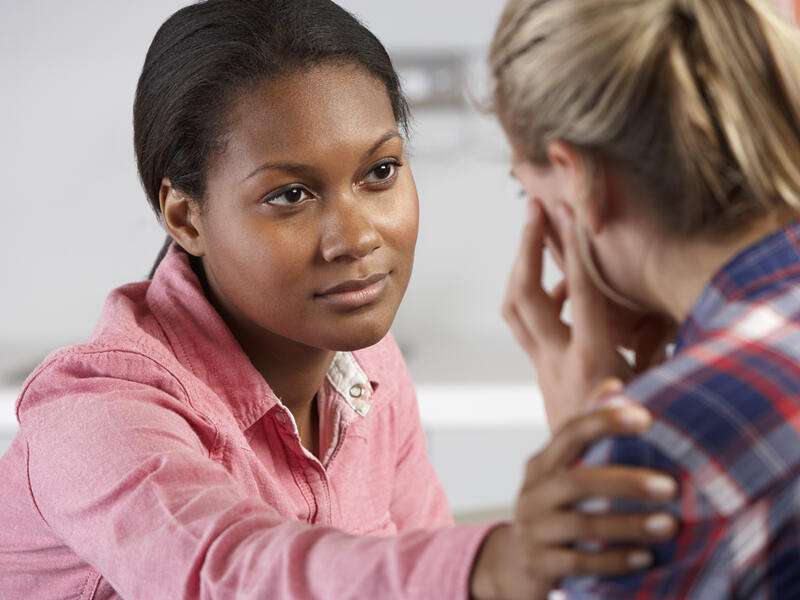Lori Dobson is an integrated health therapist for Sanford Health who often talks with people dealing with cancer.
These can be emotional conversations for patients, who are in the process of navigating what can be life-changing circumstances. Feelings of depression and anxiety are common at these times and can affect family and loved ones in addition to those with the cancer diagnosis.
What are the signs of depression and anxiety versus the normal emotions that come with a challenging health issue? What can patients who are going through this do to feel better? What can the people around them do to support their loved one with cancer?
They’re all pertinent questions to which Dobson provides helpful – and hopeful – answers.
“We really encourage people to allow and accept all feelings when they come up because they’re neither good or bad, even if some are more challenging,” said Dobson, who works in oncology and palliative care at Sanford Bemidji Medical Center. “Sometimes the more we resist these feelings, the more they persist. If we allow them to be expressed, as difficult as that can be sometimes, we’re much better off. And if we don’t allow them to be expressed, then they can just build and get stronger.”
Persistent sadness is a sign
Sadness can often be temporary, but when it persists and is affecting everyday life, it could be clinical depression. In those cases, a patient’s mental health can make it more difficult to follow treatments laid out by clinical staff.
According to the American Cancer Society, one in four cancer patients suffers from a degree of clinical depression. The causes are understandable and treatable.
“We want you to take care of yourself – give yourself some compassion and grace,” Dobson said. “If you need to rest a little more some days, that’s OK. You should treat yourself like you would a friend or loved one if they were in a similar situation.”
Sanford Health offers cancer support services that extend well beyond clinical treatment. Many of these options, in addition to one-to-one counseling, help address the mental health of cancer patients and their caregivers. Included:
- Educational classes
- Massage therapy
- Patient counseling services
- Caregiver and family counseling
- Educational resource center
- Meditation classes
- Lodging assistance
- Genetic counseling
- Oncofertility (fertility preservation)
- Cancer survivorship program
- Nutritional services
- Financial counseling
Cancer support groups are available. At many locations the offerings include Tai Chi, a practice that involves body movement and meditation, and Reiki, a complementary therapy commonly used in palliative care of cancer patients.
Caregivers can include loved ones
Dobson is part of a provider team at Sanford that cares for cancer patients. Likewise, patients have their own “teams” that often include family and loved ones. Because of their familiarity with the patient, these caretakers can often serve effectively in a diagnostic role and in a counseling role.
“Caregivers can look a lot different – it might be friends, a spouse, or siblings,” Dobson said. “You have to remember that people diagnosed with cancer tend to get a lot of advice from other people. Sometimes it’s better as a caretaker to really just listen to the person who has cancer. Just hear how they’re feeling. Or maybe just ask what you can do for them. If that means you just listen, great. If it’s something else, well, you have that covered, too.”
Because typically caregivers are close to the person with cancer, they often have insight into what is “normal behavior” for that individual. A departure from that can be a sign that this loved one’s challenges go beyond the temporary emotions that come with a cancer diagnosis.
“One area to watch for is a change in the person’s ability to function,” Dobson said. “Or maybe they’re a little more isolated, or you notice that it is hard for this person to relax. You can just ask them – are they feeling depressed? Sometimes it’s just that they’re not feeling well after a treatment. For a caretaker, it’s important to encourage the individual to talk to someone if they have concerns.”
Therapy can help you heal
Cancer does not just affect a person’s body. It also affects the person. The depression that can come with it can weaken resilience and compromise the energy needed to combat the disease. It’s why addressing anxiety and depression isn’t just about making you feel better, it’s about helping you heal.
Dobson emphasized that if you are having a hard time with a cancer diagnosis, or have noticed changes in your mood or behavior, you should reach out to your care team.
“It’s common to feel a little discomfort talking about thoughts and feelings surrounding a cancer experience,” Dobson said. “However, often that discomfort leads to more comfort because you are acknowledging the real thoughts and feelings that others also share.
“Therapy is a safe place where a person can talk, acknowledge and sort through the many thoughts and feelings about their experience. Sometimes finding new insight, or just acknowledgment, is impactful.
“I feel honored to hear their stories, and if makes them feel better in some way, then it’s all worthwhile.”
Learn more
- Cancer survivors find healing power in integrative health
- Podcast: How to manage stress after cancer diagnosis
- A daughter shares her dad’s mental health story
…
Posted In Behavioral Health, Bemidji, Cancer
